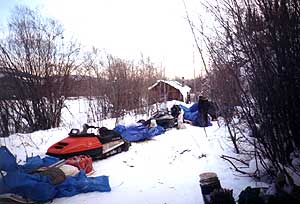 |
Return to index... |
The Call of the WildStewart River, Yukon Territory(Note: This article first appeared in The Yukon Sun, March, 1997. It documents the beginning of the 1905 Dawson Stanley Cup reenactment.) There are moments in life that capture your imagination, trawlers chugging into Victoria at sunset, the quiet, haunting stillness of Lake Louise - and the assembled townsfolk of Dawson City cascading their approval upon their native sons setting out once again to challenge the Ottawas. Roaring out of Front Street amidst the wild cheers of Dawson's populace, we filed on our snow machines down onto the Yukon River and east up the Klondike, then south on Bonanza Creek past the legendary landmarks of the original gold rush, toward the wilderness. And what a wilderness this is! When we were giants running with our bags overflowing with mountains, this is where we tripped and fell, spilling them across the earth, the larger settling between Vancouver and Whitehorse, the smaller ones skittering further all the way to the Arctic Circle. And it is into this mess of mountains we now enter. Chugging, skidding, gunning our machines we charge up the mountain trails, hanging on for dear life as we traverse glaciers and slide into switch backs, up, up we climb, emerging onto a wondrous crest trail, the jagged teeth of the Ogilvie Mountains sneering down on us from the north, unending rows of smaller, rounded mountains stretching as far as the eye can see in every other direction.
The beauty of this land is multi-layered. Overwhelming all is the cold blanketing the land with its haunting stillness, the slide of a dog sled runner heard far and wide through the vacant, deadened air. The silence is a staggering presence, a natural resource invaluable and unexportable, yet available for free here in the Yukon to anyone willing to step outside. The mountain scenery is stunning, the forests here sparse and often burned out, affording views of neighboring snowy peaks and the winding, ice-encrusted river valleys below. But more beautiful than all are my fellow travelers. The focus of hockey is usually the National Hockey League, and particularly the Stanley Cup. But to say that all hockey revolves around the Stanley Cup is like saying all politics revolves around the Prime Minister. For every kid off the ponds of Canada who plays on a Stanley Cup-winning team, there are thousands upon thousands of others who will never even come close. And herein lies the true essence of hockey. Real hockey is fathers driving sons in the pre-dawn cold to novice and Atom games, or road hockey in the short, dim-light late afternoons. Real hockey is pee-wees and bantams and intercollegiate matches, and old-timer teams drinking beer in taverns late on a Wednesday night, furtively glancing at watches. Real hockey is a bunch of guys from Dawson City, that far-off community of eighteen hundred souls lost in the great expanse of the Yukon Territitory, deciding to challenge for a rematch of a long lost loss, four thousand miles away in Ottawa. They've sold neckties, had bar nights, held costume parties to raise money. They've had casino nights and salmon barbecues and dances, the women of the town the unsung heroes, Margo Anderson and Kathy Donnelly, and in Whitehorse Wendy Burns and Iris Johnson, expending their effort without even a glimpse of the glory. The players are taking a month off without pay. They've been required to kick in a couple of thousand dollars of their own money to secure a place on the team. And they've accomplished the hardest thing of all, convincing their wives and girlfriends of the utter necessity to do this thing. And these are the guys surrounding me now, lost in a million square miles of utter wilderness. I rise this morning at our camp on the banks of the Stewart River. It is forty degrees below zero. I observe twenty hockey players chopping wood, melting snow in great blackened coffee pots, frying bacon, refilling gas tanks, repacking sleds, feeding dogs, taking down tents. My right ear is numb, my face frost bitten, I can't close my right hand, and my entire body is terribly sore from two days of jolting and swaying on my snow machine. We face sixty-five mountain miles before reaching our next camp at Pelly Farm. And there is no place on earth I'd rather be. |
